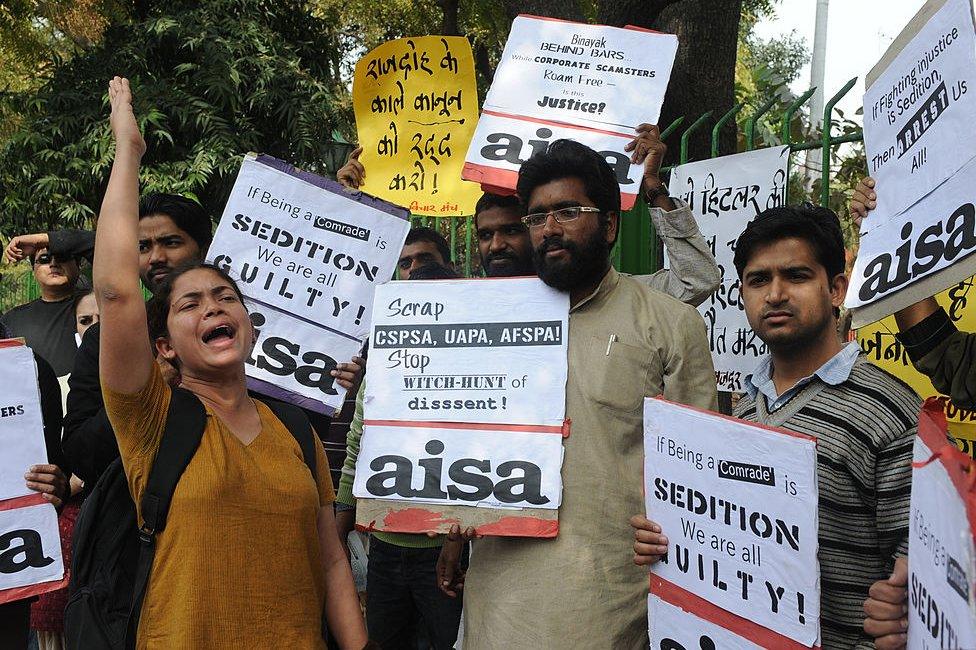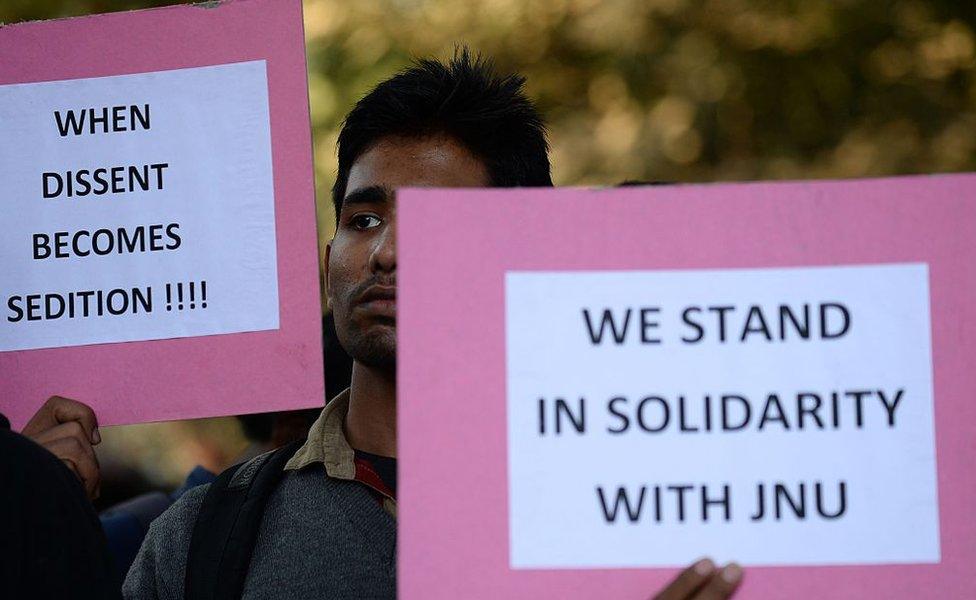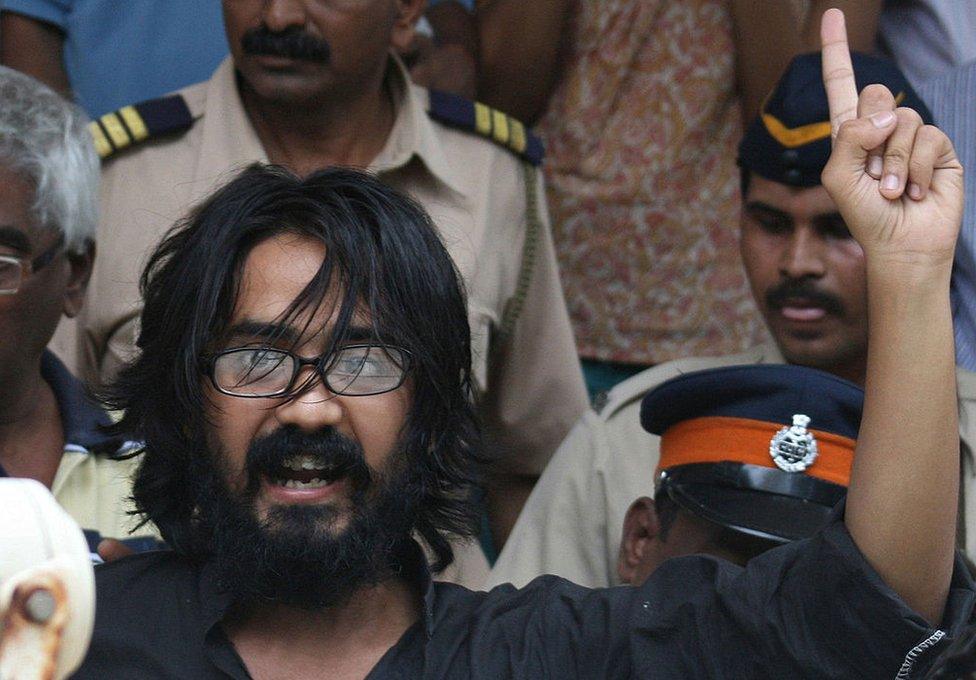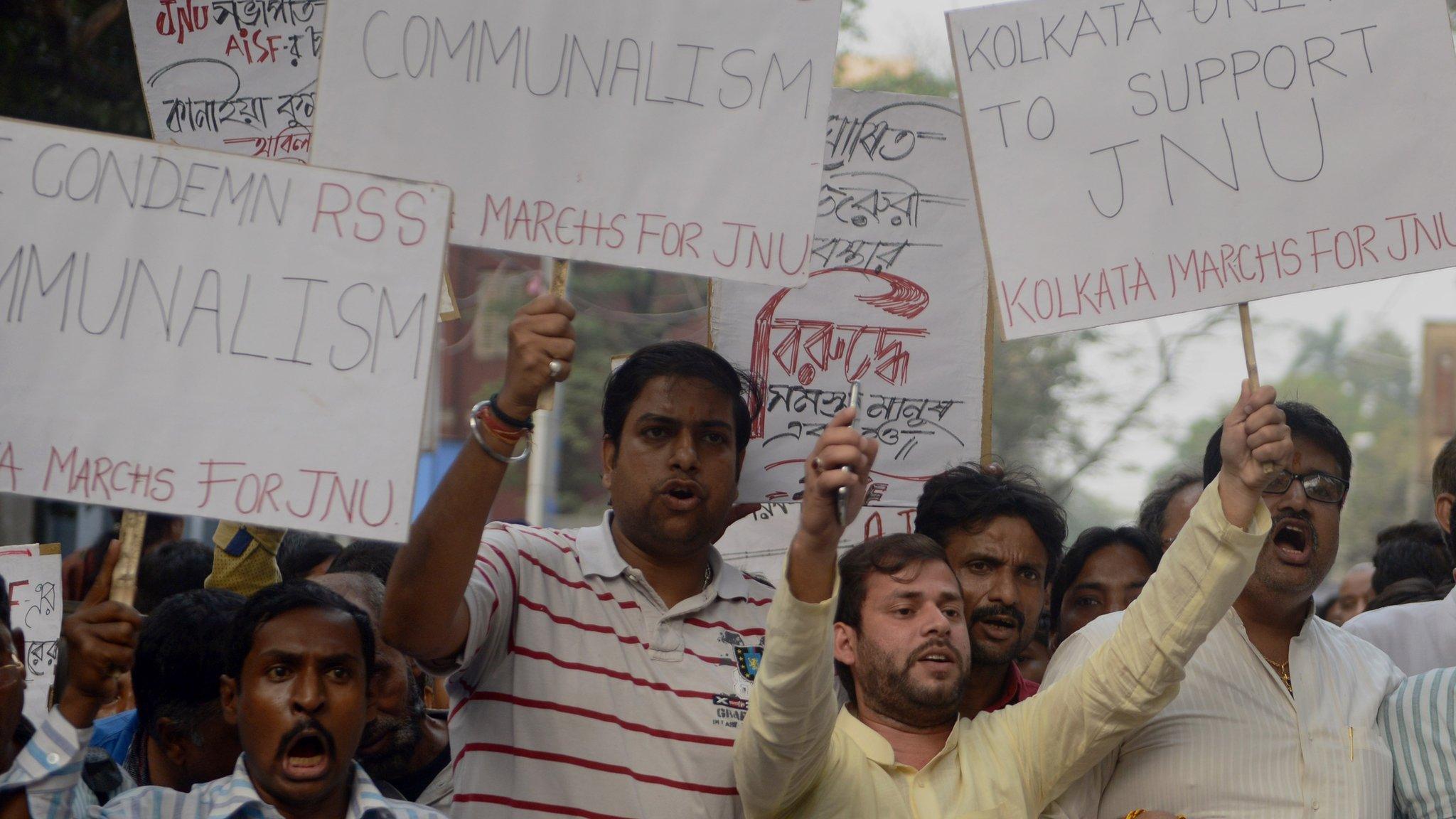Why India needs to get rid of its sedition law
- Published

India's colonial era sedition law was introduced in the 1870s
In India, you can be charged with sedition for liking a Facebook post, external, criticising a yoga guru, external, cheering a rival cricket team, external, drawing cartoons, asking a provocative question, external in a university exam, or not standing up in a cinema when the national anthem is being played, external.
So when actress-politician Divya Spandana, better known by her screen name Ramya, made some remarks last week praising Pakistan, a lawyer filed a private case in a local court, seeking to get her charged with sedition for "appreciating the people of Pakistan", India's neighbour and rival.
Ramya had returned from a trip to Islamabad and found Pakistan was "not hell" - a riposte to the Indian Defence Minister, Manohar Parrikar, who recently remarked that going to Pakistan was the "same as going to hell".
'Anti-national'
Lawyer K Vittal Gowda was clearly not impressed.
"By saying that people in Pakistan are good, she has committed sedition. This is an anti-national statement," he told my colleague Imran Qureshi in Bangalore, after filing his complaint. India's info-tech capital is no stranger to such allegedly seditious activities: earlier this month, city police slapped a sedition case against Amnesty International India after some people allegedly raised "anti-India slogans at its event".
For decades, successive governments have used a colonial-era sedition law - the dreaded section 124a of the antiquated Indian Penal Code - against students, journalists, intellectuals, social activists, and those critical of the government.

India's sedition law

Section 124a, external in The Indian Penal Code.
The law makes "words, either spoken or written, or by signs, or by visible representation, or otherwise, brings or attempts to bring into hatred or contempt, or excites or attempts to excite disaffection towards the government" punishable by law, a fine and a maximum punishment of life imprisonment.
Drafted by Thomas Macaulay, it was introduced in the 1870s, originally to deal with "increasing Wahabi activities between 1863 and 1870 that posed a challenge to the colonial government".
In the 19th and early 20th Centuries, the law was mainly used against Indian political leaders seeking independence from British rule.
Mahatma Gandhi, who was charged with sedition, famously said the law was "designed to suppress the liberty of the citizen".
In the decades after independence in 1947, the law was used against people accusing the ruling Congress government of corruption and tyranny, and little-known Communist leaders who exhorted people to "overthrow the government and capitalists".
In 1951, prime minister Jawaharlal Nehru described the law as "highly objectionable and obnoxious".
In 1962, the Supreme Court imposed limits on the use of the law, making incitement to violence a necessary condition.

More than half-a-century after the top court imposed restrictions on using the law, authorities appear to be flouting it with impunity.
As many as 47 sedition cases were reported in 2014 alone, across nine states, according to the National Crime Records Bureau. Many of these cases did not involve any violence or incitement to violence. A total of 58 people were arrested in connection with the cases. The government has only managed one conviction.

Some 9,000 people were held for sedition in Tamil Nadu for protesting against a nuclear plant
Consider this:
In September 2001, cartoonist Aseem Trivedi was arrested after a complaint that his cartoons mocked the constitution and national emblem. The charges were dropped a month later following widespread criticism and public protests.
In March 2014, 60 Kashmiri students in Uttar Pradesh were charged with sedition for cheering for Pakistan in a cricket match against India. Authorities dropped the charges following legal advice from the law ministry.
In August 2014, authorities in Kerala charged seven young men, including students, with sedition after a complaint that they had refused to stand up during the national anthem in a cinema.
In October 2015, folk singer S Kovan was held in Tamil Nadu for two songs criticising the state government for allegedly profiting from state-owned liquor shops at the expense of the poor.
In February 2016, student leader Kanhaiya Kumar was arrested and charged with sedition for allegedly shouting anti-India slogans. He was later freed on bail.
In 2012 and 2013, an astonishing number of 23,000 men and women who protested against a nuclear power plant in Tamil Nadu were held for "waging war against the state", external and sedition - 9,000 of them for sedition alone. "Police would name a few accused and then add 2,000 others without naming them while booking them for sedition. That's how arbitrary it is," anti-nuclear activist SP Udayakumar tells me.
'Instilling fear'
Some 140 cases, half of them related to sedition, against the protesters are being heard in the courts today. "The law is purely used now to instil fear and intimidate people who protest against authority," says Mr Udayakumar.

Aseem Trivedi was charged with sedition for drawing cartoons
Things seem to be getting worse.
Media watchdog The Hoot says it is "raining sedition charges in an otherwise normal monsoon season" this year. It has listed 18 cases, external involving sedition charges against 19 people in the first eight months of 2016.
India's slow moving judicial system ensures prolonged delays in disposing cases. Meanwhile, people charged with sedition have to surrender their passports, are not eligible for government jobs, must produce themselves in the court as and when required, and spend money on legal fees. "The charges have rarely stuck in most of the cases, but the process itself becomes the punishment," says Jayshree Bajoria , co-writer of a Human Rights Watch report on "stifling dissent", external in India.

Actress Ramya was accused of sedition for praising Pakistan
Earlier this month a non-profit group mounted a fresh legal challenge against the "misuse" of the law in the Supreme Court.
Common Cause, external urges the top court to make it compulsory for the authorities to "produce a reasoned order" from the local chief of police certifying that the seditious act could either lead to incitement of violence or could lead to public disorder, before any police complaint or arrest can be made.
Most believe India should simply get rid of the law along with a raft of vaguely-worded, draconian laws - the criminal defamation laws and laws to curb hate speech and silence dissent, for example. "Sedition itself needs to enter the dustbin of oppressive legal history," says lawyer Karuna Nundy.
Clearly, scrapping the law would be a good beginning. "The sooner we get rid of it the better," Nehru had said. That was more than half-a-century ago.
- Published15 February 2016
